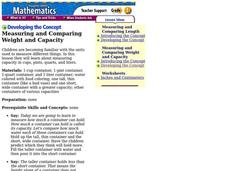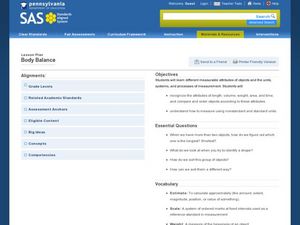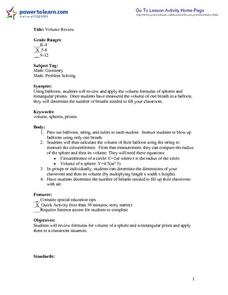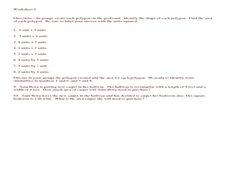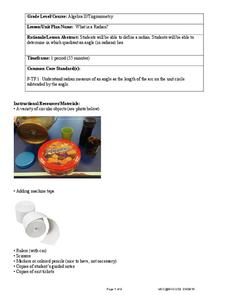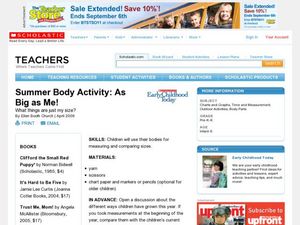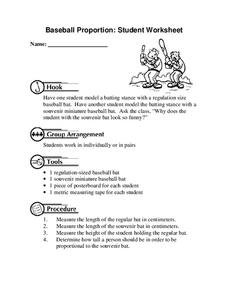Curated OER
Comparing Measurements
Students explore measurements by completing worksheets in class. In this geometry lesson plan, students identify the basic measurement units in both the English and metric systems. Students analyze 2 and 3 dimensional objects and...
Curated OER
Measuring and Comparing Weight and Capacity
First graders measure weight and capacity. In this measurement lesson, 1st graders explore visual examples of weight and capacity comparisons. Students also practice solving problems that their instructors model.
Curated OER
Everyday Measurements
Fourth graders practice measuring items with unconventional methods. In this measurement prediction lesson, 4th graders estimate the length of items a teacher brings to class and record their predictions. Students measure the...
Curated OER
Measuring and Comparing Weight and Capacity
First graders explore the concept of measurement. In this measurement lesson, 1st graders explore measurement techniques as they use containers to measure capacity. Students also practice solving problems that their instructors model.
Curated OER
Measurement Mania
Second graders observe and demonstrate how to measure different objects. They listen to the book "Corduroy," and measure different aspects of a teddy bear, discuss how to measure using a variety of units of measurement, and complete a...
Curated OER
Measurement
Students choose appropriate units of measure and predict length using the metric system. In this measurement lesson, students participate in activities in which they predict, measure, and record linear measurements such as arm span vs....
Curated OER
Measuring Inches
First graders measure the length of pipe cleaners to form worms using rulers to focus on inches. They record their results and graph the measurement of each pipe cleaner. They measure their pipe cleaner "worms" in various colors and...
Curated OER
Can You Build It?
Students investigate the concept of perimeter. They design there own figure and measure the perimeter of it. The lesson is given the context of the shape being a path that is traveled by a ladybug. This provides the shape of the plane...
Curated OER
Oodles of Noodles
Students investigate non-standard and standard measurement including inches and centimeters. They use different types of noodles as non-standard units of measurement comparing them to inches and centimeters.
Curated OER
Body Balance
Examine measurable characteristics of objects to build an understanding of the different ways you can discuss an object's size when comparing it to other objects. After whole group instruction, the class compares and organizes several...
Curated OER
How Long is a Hot Dog? Weight, Weight! Don't tell me!
Primary learners participate in activities that help them explain how different things are measured. They create their own access number chart.
Curated OER
Volume Review
Pupils investigate the concepts of volume for rectangular prisms and spheres. They measure the volume of one balloon and then consider how many breaths it would take to fill the room with balloons. The rectangular prism being measured is...
Curated OER
MUD-A Walk
Learners investigate their tracks to determine the number of footsteps it takes to travel the entire length of their bodies. Then they determine the taller of two children and the shorter of two children with their tracks. Students also...
Curated OER
Polygons
Students investigate the concepts related to the study of polygons. They specifically look at how angles is related. The lesson includes specific examples and dialogue to be used by the teacher during direct instruction and independent...
Curated OER
How Many Units?
Young mathematicians calculate the area of rectangles and squares. In this geometry lesson, learners are grouped in pairs and use geoboards to construct rectangles. They calculate the area of the figure by counting the number of square...
Discovery Education
Sonar & Echolocation
A well-designed, comprehensive, and attractive slide show supports direct instruction on how sonar and echolocation work. Contained within the slides are links to interactive websites and instructions for using apps on a mobile device to...
West Contra Costa Unified School District
What Is a Radian?
Here's an algebra II activity that strives to make the concept of a radian less abstract and more conceptual. It takes a hands-on approach to exploring the idea of a radian and allows individuals to develop a definition of a...
Curated OER
Sand Babies
An engaging lesson which has elementary learners measure weight to the nearest pound and construct and interpret a bar graph! They measure length using non-standard units and determine area using square tiles. Pupils round their birth...
Curated OER
Summer Body Activity: As Big as Me!
Students explore things that are their size, literally. In this early childhood lesson plan, students use their bodies for measuring and comparing sizes as they work in pairs to complete the activity.
National Security Agency
Classifying Triangles
Building on young mathematicians' prior knowledge of three-sided shapes, this lesson series explores the defining characteristics of different types of triangles. Starting with a shared reading of the children's book The Greedy...
Curated OER
Baseball Proportion: Student Worksheet
In this mathematics worksheet, learners model a batting stance with a regulation size baseball bat. Then they model the batting stance with a souvenir miniature baseball bat. Students measure the length of each bat in centimeters and use...
Curated OER
Making Simple Conversions
Young scholars explore the concept of measurement as it relates to equivalencies. They complete simple conversions using visual models of measurement units, and record their answers in a two-column table.
Code.org
Bytes and File Sizes
A bite of bits. The first instructional activity in a unit of 15 introduces the class to the byte. Pupils learn about other standard units for measuring file sizes, develop an understanding of relative sizes and the kind of units...
LABScI
Stoichiometry: Baking Soda and Vinegar Reactions
Examine the concept of stoichiometry using common household products. Scholars perform chemical reactions and measure the reactants and products. They compare their measurements to predictions made from the chemical equations.



